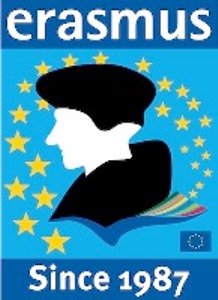Travelling Abroad in Europe with Erasmus+
Erasmus+ is an exchange programme of the European Union that supports study periods and internships across Europe.
The Department of Baltic Studies actively participates in European exchanges with ERASMUS+ and regularly holds information events about studying abroad. Please keep an eye on the noticeboards at the department. Prospective outgoing students should definitely also attend the regular introductory event (‘Initial Consultation for Studying Abroad’) organised by the International Office (Domstraße 8) to learn about the details from early on.
Studying at a European Partner University
Benefits of the Programme
- Exemption from tuition fees at the host university
- Monthly allowance according to the country group (at least 540 EUR/month for studies, at least 690 EUR/month for internships; depending on the country)
- Can be combined with Auslands-BAföG (funding for students abroad)
- Administrative support from both the home and host universities
- Recognition of non-assessed coursework governed by the Learning Agreement
- Support for students who are single parents and students with special needs
- Rights and obligations as set out in the Erasmus+ Student Charter
Where to?
You can view the department’s current partnerships on the International Contacts page.
Duration
You can receive multiple Erasmus+ grants from the third semester onwards. You are entitled to 12 months of mobility (study and/or internship) per study phase (bachelor’s/master’s/doctorate). For the Diplom and Staatsexamen (State Examination), the total is 24 months. Graduates can also receive funding for an internship for up to one year after graduation (minus the months already funded up to that point).
Planning
The procedure for your application and stay is as follows:
- Initial consultation at the International Office
- Information, advice and selection of the host university
- Application and selection at the relevant department. Please note: Applications are made for both the winter semester AND summer semester (!) of the following academic year
- Registration at the host university (from February) by the IO
- (Final) approval of the Learning Agreement
- Period of study abroad
- Recognition of credits by the respective departmental coordinator upon return
Application
In general, the application consists of a cover letter, a CV (in tabular form), a transcript of records, an overview of your course of studies, and proof of language skills. The selection criteria are derived from these documents.
The exact procedures can be found on the noticeboards at the department as well as under ‘Aktuelle Informationen’ on the department’s German homepage. If you have been nominated for an exchange place, your data will be forwarded to the International Office by 31 January. All further information regarding the application process at the partner university will then be provided by the International Office.
Subsequent Nomination
If not all of the available places have been allocated by 31 January, a subsequent nomination process for the remaining places will take place with the subject areas during the summer semester of the respective application period. Information about the application period and the call for applications will be announced/posted under ‘Aktuelle Informationen’ on the department’s German homepage as well as on the International Office’s webpages.
Extending Your Stay
If you wish to extend your stay abroad, please contact your host university first. After that, get in touch with the Erasmus coordinators at the International Office, who must receive your application for an extension at least one month before the end of your originally planned stay.
Internships/Teaching Assistant
ERASMUS+ also funds internships.
Requirements
2-12 months; full-time, from the 1st semester
Procedure
- Attend an initial consultation at the International Offiice
- Gather information and advice on recognition of credits and subject relevance within your subject area
- Search and apply for an internship at your own accord
- Submit application for funding to the International Office (at least 2 months before the start of the internship) – confirmation that the student has been accepted for an internship must be provided
Please note: EU institutions, institutions with EU programmes and German diplomatic missions are excluded. The DAAD’s Carlo Schmid Programme is available for these.
Guest Lectureships/Further Professional Development
Erasmus+ provides funding for guest lectureships (STA) at European partner universities with which there is an existing Erasmus+ agreement exists in the relevant subject area.
Guest lecturers are expected to enhance the European dimension of the host university, complement its range of courses, and share their expertise with students who are unable or unwilling to study abroad.
Periods of teaching abroad within Europe last between two days and two months (excluding travel time); the teaching load is at least eight hours per stay or per week, or part thereof.
The Staff Mobility – Staff Training (STT) programme enables employees of the University of Greifswald to undertake continuing professional development at an Erasmus+ partner university or external institution.
The requirement is a minimum stay of two working days (with a maximum of two additional days for travel to and from the destination). As a rule, stays of one week are funded (up to a maximum of two months).
Selection period: Ongoing
Selection criteria: Priority is given to first-time stays within the framework of Erasmus+ and to stays that strengthen partnerships in the subject area and in line with the Internationalisation Strategy (with a focus on the Baltic Sea region)
Applications and selections are handled by the International Office in consultation with the relevant departmental coordinator
Further information can be found here:
European Commission
ec.europa.eu
Contact
Subject Advisor
Dr. phil. Liane Klein

